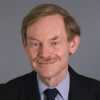Robert Zoellick

Robert Zoellick
Robert Bruce Zoellickis an American banker who was the eleventh president of the World Bank, a position he held from July 1, 2007 to June 30, 2012. He was previously a managing director of Goldman Sachs, United States Deputy Secretary of Stateand U.S. Trade Representative, from February 7, 2001 until February 22, 2005. Zoellick has been a senior fellow at his alma mater Harvard Kennedy School since retirement from the World Bank in July 1, 2012...
NationalityAmerican
ProfessionPolitician
Date of Birth25 July 1953
CityNaperville, IL
CountryUnited States of America